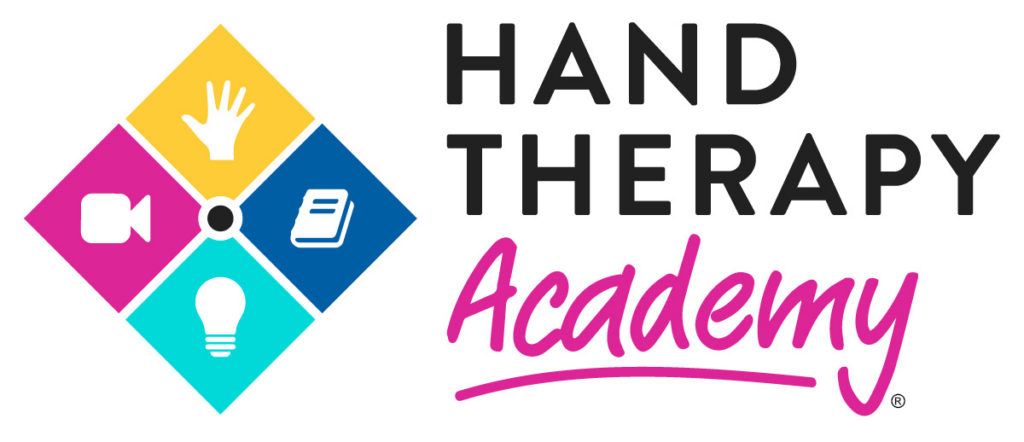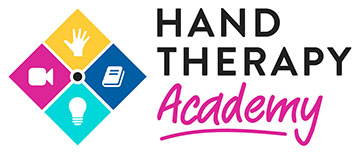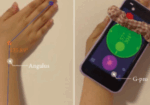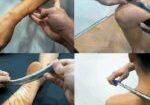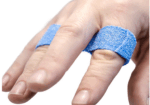Preparing for the Certified Hand Therapist (CHT) exam can feel like a mountain of work—but with a focused plan, the right materials, and a confident mindset, passing this career-defining test is completely achievable. In this in-depth guide, we’ll walk you through test prep for the CHT exam, sharing proven strategies, resources, and insider tips from CHTs who’ve successfully passed.
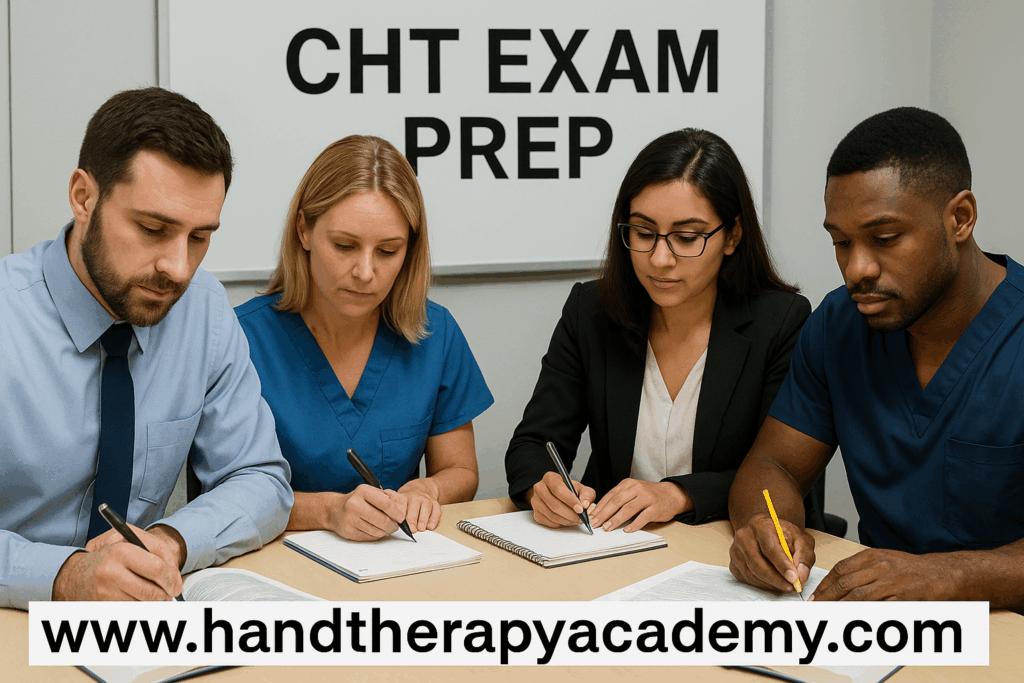
Understanding the CHT Exam Structure
What is the CHT Exam?
The Certified Hand Therapist (CHT) examination is a comprehensive, 200-question test designed to evaluate the advanced clinical skills and theoretical knowledge of occupational and physical therapists specializing in upper extremity rehabilitation. Administered by the Hand Therapy Certification Commission (HTCC), this exam assesses your ability to manage hand and upper limb disorders effectively.
Who is Eligible?
To be eligible for the CHT exam, you must:
- Be a licensed occupational or physical therapist.
- Have a minimum of 3 years’ clinical experience.
- Accumulate 4,000 hours of direct practice in hand therapy.
Format & Domains Covered
The CHT exam is a computer-based, multiple-choice test covering:
- Anatomy and Kinesiology
- Assessment and Outcome Measures
- Surgical and Non-Surgical Interventions
- Treatment Techniques
- Modalities and Orthotics
- Pathologies & Diagnoses
Setting Up a Study Plan
How Far in Advance Should You Prepare?
A 6-9 month study window is ideal. This gives you time to:
- Review foundational knowledge
- Practice questions
- Reinforce weak areas
Set milestone checkpoints every 4 weeks to assess your progress.
Weekly Study Goals & Milestones
A typical weekly structure might look like:
- Monday–Wednesday: Read and review one domain
- Thursday–Friday: Practice questions on that topic
- Saturday: Take mini-quizzes or review flashcards
- Sunday: Rest and reflect
Choosing the Right Study Materials
Best Books for CHT Exam Prep
Top-rated resources include:
- Rehabilitation of the Hand and Upper Extremity by Hunter & Mackin
- Orthotic Intervention for the Hand and Upper Extremity by Jacobs & Austin
- Fundamentals of Hand Therapy by Coppard & Lohman
Online Courses vs. Self-Study
Online programs like HTCC’s own prep course or platforms like Hand Therapy Academy offer structure, interactive modules, and practice tests. Combine them with textbooks for best results.
Flashcards & Apps
Use apps, or create your own physical flashcards. Spaced repetition software boosts memory retention. Hand Therapy Academy CHT Prep Course includes online flashcards that can be used online or printed off. They’re broken into different categories to help you focus on the areas you need the most.
Time Management Techniques
Creating a Realistic Daily Schedule
Balance is key. Start with 1–2 hours/day and increase as the exam nears. Avoid burnout by scheduling breaks and full rest days.
Managing Work-Study-Life Balance
Communicate with family and employers. Use lunch breaks or commutes for quick reviews. Even 20-minute study blocks add up.
Active Study Strategies
Practice Questions
Doing practice questions regularly is non-negotiable. They help you learn test patterns, apply knowledge, and identify weak areas.
Group Study vs. Solo Study
- Group Study: Good for accountability and discussion.
- Solo Study: Great for deep focus and customized pacing.
Mix both depending on your learning style.
Spaced Repetition
Use this technique to revisit older material over time, improving long-term memory. Schedule reviews at increasing intervals (1 day, 3 days, 7 days, etc.).
Mock Exams & Practice Tests
How to Use Mock Exams Effectively
Take at least 3 full-length timed mock exams before your test date. Treat them like the real thing—no breaks, time limits, and all. Hand Therapy Academy CHT Practice Test is a 200-question test simulation with finely selected questions.
Targeting Weak Areas
Identifying Knowledge Gaps
After each practice test, analyze which domains you scored lowest in. Use this data to refine your study plan.
Customized Review Sessions
Dedicate 1–2 days a week to revisit weak topics. Reinforce knowledge with practical examples, flashcards, and repeated questions.
Maintaining Motivation During Prep
Staying Consistent
Consistency beats cramming. Use a calendar or planner to track daily goals and build a habit.
Avoiding Burnout
- Take breaks
- Do something enjoyable weekly
- Talk to peers going through the same prep journey
Tracking Your Progress
Use charts, apps, or spreadsheets to visualize your improvement. Celebrate small wins!
Top Mistakes to Avoid
Cramming at the Last Minute
Avoid cramming. It only increases stress and rarely results in meaningful retention.
Ignoring Domains
Every domain is weighted. Don’t skip topics that seem “easy” or “less important.”
Not Reviewing Incorrect Answers
Every wrong answer is a learning opportunity. Understand why you got it wrong—and how to fix it next time.
Expert Advice from CHT Professionals
Firsthand Study Tips
- “I studied 90 minutes a day for 6 months, focusing heavily on case-based questions.”
- “Flashcards were my secret weapon.”
What They Wish They Knew Before Taking the Exam
- Don’t wait to start prepping.
- Practice tests are gold.
- Understand the clinical reasoning behind each answer.
Nutrition, Sleep, and Mental Prep
Eating for Brain Performance
Eat balanced meals rich in omega-3s, protein, and complex carbs. Hydrate often.
Quality Sleep
Prioritize 7–9 hours of sleep. Sleep is where your brain consolidates all the studying you’ve done.
Managing Test Anxiety
Try deep breathing, mindfulness, or even professional counseling. Confidence comes from preparation.
What to Do One Week Before the Exam
Final Review Plan
- Focus on summaries and high-yield content.
- Don’t introduce new material.
- Light practice tests to keep you sharp.
Test Day Logistics
- Confirm exam center location
- Check your ID requirements
- Pack your bag the night before
Test Day Checklist
What to Bring
- Two forms of ID
- Confirmation email
- Water and layers (testing rooms can be cold)
Time Management During the Exam
- Pace yourself at 1 minute/question
- Flag tough questions and return later
Staying Calm
Take 10 seconds to breathe after every 25 questions. Stay focused on what you know.
Post-Exam Expectations
What Happens After You Take the Exam?
You’ll receive a pass/fail result typically within 6 weeks. If you didn’t pass, you’ll get a breakdown by topic.
FAQs About the CHT Exam and Preparation
Q1: What is the minimum passing score for the CHT exam?
A: The HTCC does not release a fixed score, but historical estimates suggest around 70–75% correct.
Q2: How often can you retake the CHT exam?
A: You may retake the exam twice per year, but must reapply and pay the fee each time.
Q3: How long should you study for the CHT exam?
A: Most candidates recommend 6-9 months of structured preparation.
Q4: Is the CHT exam harder than the NBCOT exam?
A: It’s different—more focused, clinical, and scenario-based. Many find it tougher due to the advanced content.
Q5: What happens if you fail the CHT exam?
A: You’ll receive feedback on weak domains. You can apply to retake it during the next available testing window.
Q6: Can international therapists take the CHT exam?
A: Only if they hold a valid occupational or physical therapy license and meet all HTCC requirements.
Conclusion: Final Thoughts and Encouragement
Passing the CHT exam is more than just a credential—it’s proof of your dedication to the field of hand therapy. Stay organized, pace yourself, and lean on the tools and community available to you. With structured test prep for the CHT exam, success is not just possible—it’s probable.
More To Read
The Identification of Mobile Applications for Distal Radius Fractures Rehab.
By Taylor Landholm Chen, Y., Yu, Y., Lin, X., Han, Z., Feng, Z., Hua, X., Chen, D., Xu, X., Zhang, Y., & Wang, G. (2020). Intelligent Rehabilitation Assistance Tools for Distal Radius Fracture: A Systematic Review Based on Literatures and Mobile Application Stores. Computational and Mathematical Methods in Medicine, 2020, 7613569. https://doi-org.methodistlibrary.idm.oclc.org/10.1155/2020/7613569 The Skinny The…
What is the Effectiveness of IASTM?
Citation Kim, J., Sung, D. J., Lee, J. (2017). Therapeutic effectiveness of instrument-assisted soft tissue mobilization for soft tissue injury: Mechanisms and practical application. Journal of Exercise Rehabilitation, 13(1). doi: https://doi.org/10.12965/jer.1732824.412 The skinny IASTM is a relatively simple technique that uses the surface of an instrument to minimize the amount of pressure or force needed…
Video Augmented Hand Therapy after CVA with hemiplegia.
The previous rapid review discussed the positive outcomes of video-augmented hand therapy after a CVA with hemiplegia. Please watch this vlog to discover how to make the video augmented box to make it easily integrated into your clinic. Video By: Shannon Skowbo
A randomized clinical trial comparing early active motion programs: Earlier hand function, TAM, and orthotic satisfaction with a relative motion extension program for zones V and VI extensor tendon repairs
By Brittany Day Collocott SJ, Kelly E, Foster M, Myhr H, Wang A, Ellis RF. A randomized clinical trial comparing early active motion programs: Earlier hand function, TAM, and orthotic satisfaction with a relative motion extension program for zones V and VI extensor tendon repairs. Journal of Hand Therapy. 2019. doi:10.1016/j.jht.2018.10.003 The Skinny- This is…
Sign-up to Get Updates Straight to Your Inbox!
Sign up with us and we will send you regular blog posts on everything hand therapy, notices every time we upload new videos and tutorials, along with handout, protocols, and other useful information.
